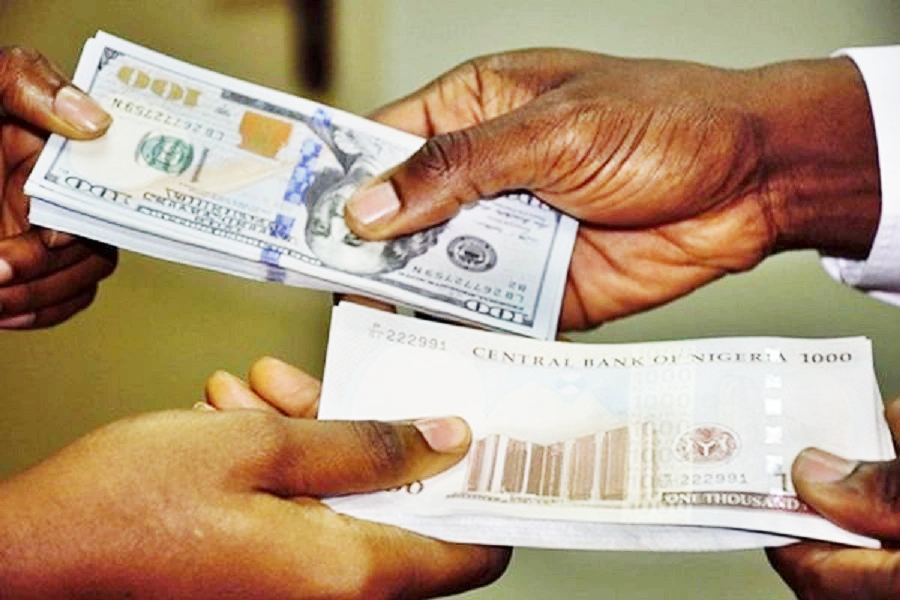The current disparity in the value of the naira at the official foreign exchange window and the parallel market has further expanded the opportunities for individuals who benefit from arbitrage in the foreign exchange market.
While the value of the naira at the Nigeria Autonomous Foreign Exchange window (NAFEX) also known as the Investors and Exporters window (I&E) around N447 to the dollar, the value of the local currency on the streets has declined to N850/$ as of Friday, November 4. The naira seems to be heading on a one way drive, downwards, due to activities of speculators.
The disparity in the value of the currency, which has reached N403 has further spurred arbitrage in the foreign exchange market. Foreign exchange arbitrage is a strategy that allows retail forex traders to profit without open currency exposure.
Specifically, it is the simultaneous purchase and sale of currency in two different markets to exploit short-term pricing inefficiency. Thus, in the Nigerian context, traders take advantage of the huge disparity in the official and parallel market rates to make profit.
Findings by NATIONAL ECONOMY show that one of the most prevalent and widespread arbitrages is that done by individuals who get business and personal travel allowance from banks at the official rates and sell at the black market. The CBN had warned against individuals who do this saying that they will be blacklisted if caught.
Although some commercial banks had published names of individuals who had obtained BTA without travelling as well as those who did not refund unutilised BTA, the publications had faded with time, emboldening more individuals to continue with the act.
However, this act is for the small-time players as the big-time players in the arbitrage business have connections in higher places in the banking industry. NATIONAL ECONOMY gathered that most of the big-time players in the field of arbitrage have links within the banks.
A player in the market explained that as banks are always in the know of who has foreign exchange and who needs foreign exchange they form the link of the underground movement of dollars, which were purchased at the official rate to be sold at the black-market rate.
Speaking on the arbitrage in the Nigerian foreign exchange space, head of financial institutions ratings at Agusto&Co, Ayokunle Olubunmi, noted that in terms of arbitrage, there is nothing that can really be done until the gap between the official and parallel markets are closed or brought closer. “We have heard that the EFCC is going after those people but history has shown that it cannot be effective.
“The best thing is to remove that opportunity. Once there is a huge difference between the official and parallel market, people will always do whatever they can do to take advantage of the arbitrage. There is so little that can be done as long as that incentive is there, people will find a way around the system to ensure that they take advantage of it.
“As an exporter you want me to sell at official rate of N440 when I know I can sell outside at N900 which is more than double the price, I will do whatever I can to enjoy that rate. So, the best thing is to try and eliminate that incentive,” he said.
Economist and chief executive of Global Analytics Consulting Limited Tope Fasua, largely views the problem through the lens of perception. He caveated that a unified exchange rate is never going to happen as there is hardly any unified exchange rate between the parallel and official markets in any country. He said 50 per cent of the value of any currency is based on perception, and that individuals were entitled to their individual freedoms to bargain at whatever rates they were willing to exchange their money for.
He said the black market will continue to exist. He argued that Nigerians’ understanding of economics must evolve as there is no grounding point for saying that the country’s currency must be determined by demand and supply.
He also stated that one of Nigeria’s problems is that we seem to have an innate belief that the naira is rubbish. Fasua added that 50 per cent of the value of a currency is based on perception—if you think your currency is rubbish it will be rubbish, which is a self-fulfilling prophecy.
The Divisional head of strategy, Heritage Bank, Segun Akanji, blamed the hemorrhaging naira on institutional void. He said institutions are not strong, which causes corruption, which in turn causes crime.
He said the country needs strong policies, which should help determine price, premium and return. He also queried the country’s balance sheet, which he said is not strong. Akanji said a strong balance sheet should give confidence to investors.
He stated that the CBN needs to take another look at its balance sheet with international assets. “The CBN balance sheet is too nairanised. There need to be some international assets,” he said. “Bring in international institutions to facilitate financial clearing so that we have sitting capital, not transit capital.”
Professor of Economics, Usman Dan Fodio University, Gbenga Gbangbose, said the naira is losing value steadily due to demand-pull inflation. He said there is so much money in the system chasing fewer goods, which erodes the value of the local currency.
Gbangbose praised the move by the CBN to redesign the biggest denominations of the naira notes, stressing that if the change of design exercise goes on smoothly and the monetary authority is able to get 80 percent of the naira into the banking system, inflation will reduce and the naira will regain value, “at least to some extent.”





